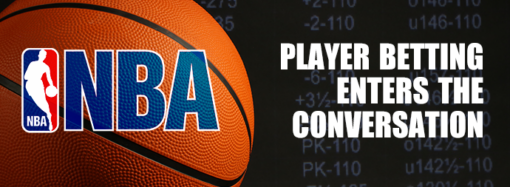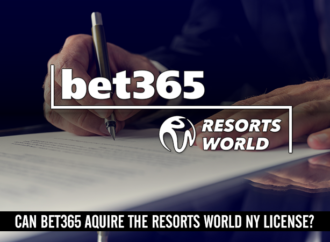It’s September 1 at Delaware Park, just 45 miles from Philadelphia. Everything is ready to go. The granite table tops are polished and ready to go. The huge wall of television (there is an 82 individual 50-inch television wall) is blaring the NFL Pre-game show and the odds board is lit up. But where are
It’s September 1 at Delaware Park, just 45 miles from Philadelphia. Everything is ready to go. The granite table tops are polished and ready to go. The huge wall of television (there is an 82 individual 50-inch television wall) is blaring the NFL Pre-game show and the odds board is lit up.
But where are the sports bettors?
Probably at home on their phone or computer, because today the 3rd Circuit Court of Appeals ruled that Delaware’s plan to allow single game, Vegas style sports betting is in violation of the Professional and Amateur Sports Protection Act (PASPA). Thus, no single-game sports wagering will occur this football season in Delaware. And, wagering on sports other than the NFL are also in question.
Sad for Delawareans, certainly. But, the fact remains that this is a sad for sports betting in the U.S.. By this ruling, the court has basically come out and said that there will be no new sports betting anywhere, any time soon.
The NFL and the rest of the major sports leagues and NCAA had managed to get the 3rd Circuit Court of Appeals to expedite their request for an injunction against sports betting in Delaware. They brought their suit against Governor Markell, stating that ‘irreparable harm’ would occur to the leagues and their brands if this type of sports betting was allowed. Had Delaware been able to confine the arguments to just the harm that their proliferated betting was going to cause, they may have had a shot at packing their shiny, new sports betting parlors on September 1.
Attorney Kenneth Nachbar, who presented a solid case for the leagues and was very resilient to the sometimes hostile line of questions from the three-judge panel, stated early on that PASPA clearly prohibits single game wagering in Delaware. He quoted from the law, “to the extent that the (betting) scheme does not change form what existed before”. What the leagues’ contention was basically saying is that they know that Delaware had parlay betting before and that is (begrudgingly) ok, and is covered by PASPA. But, Delaware cannot add in single game wagering, because they did not offer single game wagers before PAPSA was enacted (1992).
The lawyers for Delaware, David Margules and Joel Friedlander, were dragged into a discussion on the legality ‘merits’ of the case. They tried in vain to keep on focus that single game betting was not going to cause irreparable harm to the leagues. Having to fight a potantial PASPA violation was unltimmately the downfall for the defense.
Judge McKee came out firing at Delaware’s first lawyer, Margules, saying that this situation was a “complete mess”. He went on to claim that Delaware could be selling illegal tickets, causing the state to become an illegal bookie. He appeared quite worried that the December case involving the merits of Delaware’s sports betting law and subsequent implementation would be found to be illegal. Judge Hardiman chimed in that it was up to Delaware to prove that their betting plan was not illegal. He said, “you have no problem with this court ruling the case on merits?” Later, he added to Friedlander, who was there to argue the case based on merits, that he was “fighting an uphill battle . . . at least with me.”
Friendlander did manage to make some headway with the judges. He stated the if you want to take what is said in the law literally, “we can only operate the three parlay games that we had before” and (Delaware) “could only operate them for four months, because that is what we did before.” Judge Hardiman did seem to like this line of reasoning and added in that you couldn’t “bet on the Texans, because they were not in existence before.” He added that schedules back then were only 14 games when Jude McKee, apparently an avid Cleveland Browns fan, noted that there were only 12 games in his team’s heyday. Hardiman said “it depends how thinly you want to slice the onion.”
The judges asked for a 35 minute recess after hearing again from the NFL’s Nachbar. The courtroom buzz was brisk and centered on the illegal betting that could be going on in Delaware. It appeared as if the NFL had done an outstanding job in presenting their case and had the upper hand early but Delaware’s Friedlander hit a three at the buzzer. It was anybody’s guess what the judges were discussing.
The three judges came back into the room more than 45 minutes later and Judge McKee read the courts’ decision. He said that Delaware’s single-game betting was in “violation of PASPA,” adding that “Delaware sports betting is not covered under the exemptions in the law.” Apparently, they did decide to rule this case on the merits, not mentioning the original reason that we were all there, the irreparable harm to the leagues. After all, with this decision, that is now a moot point.
Nachbar told a group of reporters after the trial that the NFL was “delighted†at the outcome.
They should be. The NFL, NCAA and other major sports leagues went to court looking for an injunction to temporarily halt Delaware’s sports betting. Instead, they got the decision that they were to seek in December. As of right now, they may have gotten the ultimate victory. Because, even through the Delaware racinos have already built their sports betting facilities, it is not without cause that they may opt out of this entirely. State studies have given an estimate that 90% of their wagers would be on single games. Parlay-only wagering could end up being a losing gambling proposition for the house (state). And that just wouldn’t be gambling.
4 comments
















4 Comments
delaware sports betting – æµ·è¿å¥³
August 25, 2009, 3:20 am[…] on such wagering, essentially.Courier Times Now – http://blogs.phillyburbs.com/news/bcct/|||Off Shore Gaming Association » 3rd Circuit Rules Against Delaware …He went on to claim that Delaware could be selling illegal tickets, causing the state to become an […]
REPLYOff Shore Gaming Association » 3rd Circuit Rules Against Delaware … | The Secret Million Dollar BET
August 25, 2009, 5:09 am[…] See the original post here: Off Shore Gaming Association » 3rd Circuit Rules Against Delaware … […]
REPLYSports Betting
August 25, 2009, 9:43 amthere was a recent discussion on BBC about offline and online sports betting in US
REPLYthey say 60-70% of public is not against sports betting
but sill they need 70% of public who wish to bet instead of just not going against it.
Jim Quinn
August 25, 2009, 1:35 pmI hear what you are saying sportsbetting. The real shame is that there were about 15 reporters, OSGA and a bunch of lawyers in the courtroom. Not a single gambler showed up.
REPLY